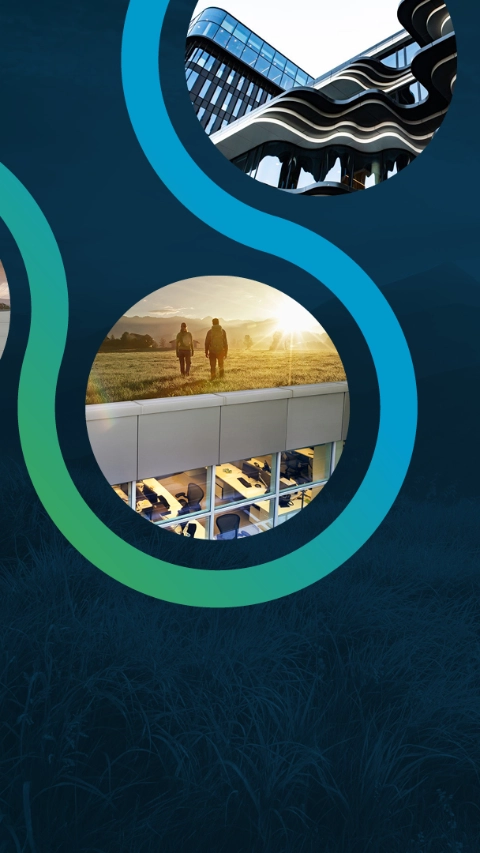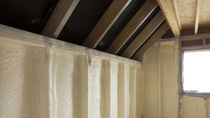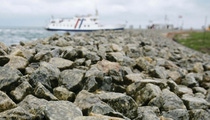Reduce carbon emissions
by 25% by 2030

Construction
Build a Brighter Future with Sustainable Construction
The world’s biggest challenge is climate change, and we must all work together to build the path to a more sustainable and durable future in construction. This means coming up with new designs, technology, construction methods and building materials that have a positive or neutral impact on the environment and achieve long-term energy and resource efficiency.
When you use our versatile materials and products, you combine the principles of modern building with an ever-growing need to minimize the negative impact on the environment and the ecosystem at large. BASF materials help to create, protect and sustain your construction project for a safer and more sustainable future.
With a reach that allows us to serve customers around the globe, we want to partner with you to help reach your sustainability goals.
BASF develops sustainable building solutions that help us reduce the carbon footprint of our products and create value with renewable resources.
To achieve our ambitious climate goals, we're now going one step further, launching the first comprehensive portfolio of low PCF Polyurethanes and Engineering Plastics.
We manage this by using a combination of renewable, bio-based resources, recycled materials and externally certified biomass balance allocation (BMB), in the respective sub-components.” Our low PCF products help our customers to reduce their carbon footprint significantly.
Join us on #ourplasticsjourney
Increase energy efficiency and safety by significantly improving your insulation with our polyurethane (PU) sandwich panels. With their superior insulation values, our thin, PU sandwich panels are energy-efficient while also providing fire protection.
Elastopir® Blue — A PU rigid foam to produce highly energy-efficient and thin construction elements, it also provides fire protection that is free of halogens
Elastopir® BioMass Balance — Significantly decrease your carbon footprint with a solution that combines renewable resources without sacrificing quality. Elastopir BMB is chemically identical to the standard fossil product and is based on a mix of fossil and sustainable raw materials.
Reduce your GWP (Global Warming Potential) with our polyurethane spray foam insulation Elastospray® LWP and Skytite® LWP. In alignment with the ambitious EU goal to cut F-gases by two-thirds by the year 2030, this new generation of spray foam insulation uses hydrofluoroolefins (HFO), a more environmentally friendly blowing agent.
Elastospray® LWP – Our LWP systems are the consistent further development of BASF’s proven spray foams. In addition to improving environmental compatibility, they deliver the accustomed superlative insulation, particularly thanks to their closed-cell structure. In residential or commercial buildings, new or renovated, Elastospray® LWP is an assurance of excellent thermal insulation and an outstanding interior climate.
Skytite® LWP - Our new closed-cell spray foam roofing system is 100% water-blown, making it first choice for sustainable, modern and innovative construction. The system is characterized by high density, stability and durability and can be applied directly onto the existing roofing structure to reduce the amount of waste going to landfill.
WALLTITE® LWP - This closed-cell spray polyurethane foam (SPF) insulation offers superior air sealing properties for increased energy efficiency of any type of building. Using chemistry based on hydrofluoroolefins (HFOs), WALLTITE LWP offers a low global warming potential (GWP).
Protect nature as well as your power and water supplies with unique, long-lasting materials that don’t require invasive machinery. Because our solutions are low-maintenance and easy to install, you can reduce costs while increasing your positive impact on the environment.
Elastopave® — Perfect for urban areas, this water-permeable solution reduces water damage while allowing water to seep into the ground where it belongs, replenishing the valuable groundwater needed for drinking and daily living.
Elastocoast® — Rising sea levels and flooding require new ways of protecting our coasts and riverbanks. Substantially increase safety and protect nature without the need for heavy machinery when you use this unique material as a revetment in coastal areas and as a stabilizer on riverbanks.
Skytite® is especially designed for the external insulation of roofs and is part of a new generation of spray foams that sets new standards of environmental compatibility by using hydrofluoroolefins (HFO) as their blowing agent.
Elastospray® is a multifunctional insulation foam for ceilings, walls and floors which sets new standards of environmental compatibility by using hydrofluoroolefins (HFO) as its blowing agent.
Elastopir® Blue is a new polyurethane rigid foam solution with a low lambda value (down to λD = 19 mW/m ∙K) that achieves exceptional standards of energy efficiency, setting new standards for sandwich panels.
Elastopir® Biomass Balance helps you to develop sustainable solutions while delivering the same high-quality products. Fossil resources are replaced by 100% renewable raw materials, contributing to a substantial reduction in greenhouse gas emissions.
Elastopave® exploits the principle of binding suitable mixes of crushed stone with polyurethane to yield a strong, water- and air-permeable surface. Rainwater can percolate effectively and replenish aquifers.
Elastocoast® opens up a totally new dimension in coastal protection that makes existing dikes safer without their having to be continually raised. It prevents wave impact energy from attacking and destroying their surface.
Striving to create endless possibilities for you through our portfolio of sustainable engineering plastics and polyurethanes, we have set ourselves ambitious sustainability goals. These goals help our industry get closer to a net-zero future and a true circular economy.
Reduce carbon emissions
by 25% by 2030
Contribute significantly to BASF Group's €17 billion circular sales by 2030
Achieve net zero carbon
emissions by 2050
Meet your sustainability goals with a proven partner who also supports engineering, design, material selection, testing and serial production. We can deliver:
Self-service solutions:





